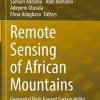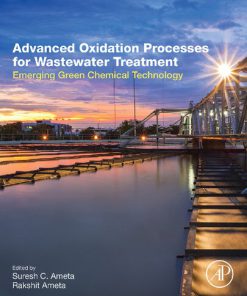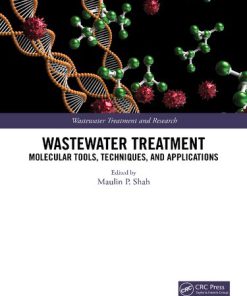Petroleum Industry Wastewater Advanced and Sustainable Treatment Methods 1st Edition by Muftah El Naas, Aditi Banerjee ISBN 9780323858847 0323858848
$50.00 Original price was: $50.00.$25.00Current price is: $25.00.
Petroleum Industry Wastewater Advanced and Sustainable Treatment Methods 1st Edition by Muftah El Naas, Aditi Banerjee – Ebook PDF Instant Download/Delivery: 9780323858847 ,0323858848
Full download Petroleum Industry Wastewater Advanced and Sustainable Treatment Methods 1st Edition after payment

Product details:
ISBN 10: 0323858848
ISBN 13: 9780323858847
Author: Muftah El Naas, Aditi Banerjee
Petroleum Industry Wastewater: Advanced and Sustainable Treatment Methods discusses the status of different approaches and advanced processes involved in the treatment of petrochemical and petroleum industry wastewater. The book focuses on advanced, sustainable, and environmentally friendly technologies for removing toxic pollutants from contaminated waters. The book also explores the environmental aspects and impacts of the petroleum industry discharge wastewater, their effect on aquatic life, and possible ways to deal with these effects. Keeping the global water crisis and fast depletion of natural fresh water in mind, more immediate knowledge, information, implication, and effective utilization of available resources are required than we anticipated. The book brings a wide range of methodologies and perspectives under one roof in a comprehensive manner.
- Describes advanced strategies and methods involved in petroleum industry water treatment
- Deals with ways to treat discharged water through cutting-edge technologies
- Presents an overview of pollutant degradation in industrial wastewater
- Highlights advanced and technological know-how for a variety of applications
Petroleum Industry Wastewater Advanced and Sustainable Treatment Methods 1st Edition Table of contents:
Chapter 1. Treatment of petroleum industry wastewater: current practices and perspectives
Abstract
Introduction
Electrochemical methods
Membrane-based methods
Biomaterial-based methods
Biological methods
Life cycle assessment
Summary and future perspectives
References
Chapter 2. Chemistry of petroleum wastewater
Abstract
Introduction
Petroleum wastewater characteristics
The methods for measuring the main compounds in petroleum wastewater
Total residual chlorine
Total suspended solids
Oil and grease
Nitrate
Biochemical oxygen demand
Chemical oxygen demand
Total organic carbon
References
Chapter 3. Concomitant degradation of petroleum products and microplastics in industrial wastewater using genetically modified microorganisms
Abstract
Introduction
Interaction of petroluem hydrocarbons with microorganisms
Biodegradation of petroleum hydrocarbons by microorganisms
Aerobic degradation
Anaerobic degradation
Degradation using biosurfactants
Degradation of hydrocarbons by chemical oxidation
Degradation using genetically modified organisms
Degradation of contaminants through genetically modified synthetic microorganisms
Vector
Mechanism
Fate of the end products
Conclusions
Future prospects
References
Chapter 4. Constraints and advantages of bacterial bioremediation of petroleum wastewater by pure and mixed culture
Abstract
Introduction
Petroleum wastewater
Petroleum wastewater characteristics
Pretreatment process for biological stabilization
Physical treatment
Chemical treatment
In situ biological treatment of petroleum wastewater
Bioremediation
Anaerobic process
Aerobic process
Integrated biological process
Phytoremediation
Commercially available bioremediation agents
Advantages and disadvantages of biological process (using both pure or mixed culture)
Conclusions
References
Chapter 5. Prospects of green technology in the management of refinery wastewater: application of biofilms
Abstract
Introduction
Biotreatment options for refinery wastewater
Immobilized-biofilm application
Conclusions
Acknowledgments
References
Chapter 6. Algal bioremediation versus conventional wastewater treatment
Abstract
Introduction
Conventional Ww treatment technologies
Algal culture for Ww treatment systems
Bioaccumulation and bioassimilation
Algae harvesting
Conclusions
References
Chapter 7. Application of microalgae in wastewater treatment: simultaneous nutrient removal and carbon dioxide bio-fixation for biofuel feedstock production
Abstract
Background
Algae and wastewater treatment
Industrial wastewater treatment
Algae and energy production
Algae and biofuel production
References
Chapter 8. Membrane-based treatment of petroleum wastewater
Abstract
Wastewater in the petroleum industry
Implementation of membrane processes as advanced treatment methods
Performance of membrane processes for the treatment of petroleum wastewater
Existing challenges and potentials of membrane-based processes
Sustainability consideration of membrane processes
Conclusions
References
Chapter 9. Management of petroleum wastewater: comparative evaluation of modern and traditional techniques
Abstract
Introduction
Types of waste generated in oil refineries
Methods and recommendations for sustainable management of wastewater
Conclusions
References
Chapter 10. Nanocomposite material-based catalyst, adsorbent, and membranes for petroleum wastewater treatment
Abstract
Introduction
Application of sorption for petroleum wastewater treatment
Nanocatalysis, and their composite as adsorbents
Methods of nanocomposite synthesis as adsorbents
Carbon-based nanocomposite
Organic and inorganic-based composite adsorbents
Application of green adsorbents in petroleum wastewater treatment
In-depth mechanism of pollutants adsorption in petroleum wastewater field
Application of membrane technology for petroleum wastewater treatment
Conclusions
References
Chapter 11. Treatment of petroleum wastewater using solar power-based photocatalysis
Abstract
Introduction
Petroleum wastewater
Petroleum wastewater characteristics
Petroleum wastewater treatment technology
Photocatalysis
Fundamentals and treatment mechanisms
Best photocatalysts
Nanotechnology and photocatalysis
Factors influencing photocatalysis
Limitations
Conclusions
References
Chapter 12. Electrochemical treatment of petroleum wastewater: standalone and integrated processes
Abstract
Introduction
Electrochemical processes fundamentals
Electrochemical-based hybrid and integrated processes
Challenges and outlook
References
Chapter 13. The viable role of activated carbon for the effective remediation of refinery and petrochemical wastewaters
Abstract
Introduction
Classification, unique characteristics, and applications
Preparation of activated carbon
Activated carbon from renewable feedstocks and industrial waste
Potential roles of activated carbon for the treatment of refinery and petrochemical wastewaters
Biochar—a derivative of activated carbon for the treatment of refinery and petrochemical wastewaters
Recent advances in the activated carbon-assisted hybrid treatment technology
Regeneration and reusability
Perspective and outlook
Conclusions
References
Chapter 14. Life-cycle assessment and cost-benefit analysis of petroleum industry wastewater treatment
Abstract
Introduction
An overview on life-cycle assessment
Life-cycle phases
Life-cycle impact assessment of petroleum wastewater treatment
Economic efficiency analysis
Concluding remarks
References
Chapter 15. Sustainability of wastewater treatment
Abstract
Background
Characteristics
Impact on environmental and human health
Sustainability
Treatment technologies
Sustainability of petroleum industry wastewater treatment
Recovery of various resources from petroleum industry wastewater
Future perspective
Conclusions
Acknowledgments
References
Chapter 16. Circular economy in petroleum industries: implementing Water Closed Loop System
Abstract
Industrial water and wastewater
Water and wastewater in oil and gas industries
Principles of circular economy
Water closed-loop system; theories and concept
Conclusion and recommendations
References
Index
People also search for Petroleum Industry Wastewater Advanced and Sustainable Treatment Methods 1st Edition:
oilfield wastewater
petroleum industry waste
mw petroleum
petroleum wastewater
petroleum industry process
Tags: Muftah El Naas, Aditi Banerjee, Petroleum Industry, Sustainable Treatment Methods
You may also like…
Engineering - Energy & Power Resources
Petroleum Nanobiotechnology: Modern Applications for a Sustainable Future 1st Edition El-Gendy
Uncategorized
Business & Money
The Mexican Petroleum Industry 1938 1950 by J. Richard Powell 0520346041 9780520346048
Uncategorized
Membrane and Membrane-Based Processes for Wastewater Treatment 1st Edition Maulin P. Shah
Technique - Water Treatment
Wastewater Treatment Using Green Synthesis 1st Edition Swapnila Roy
Technique - Water Treatment











